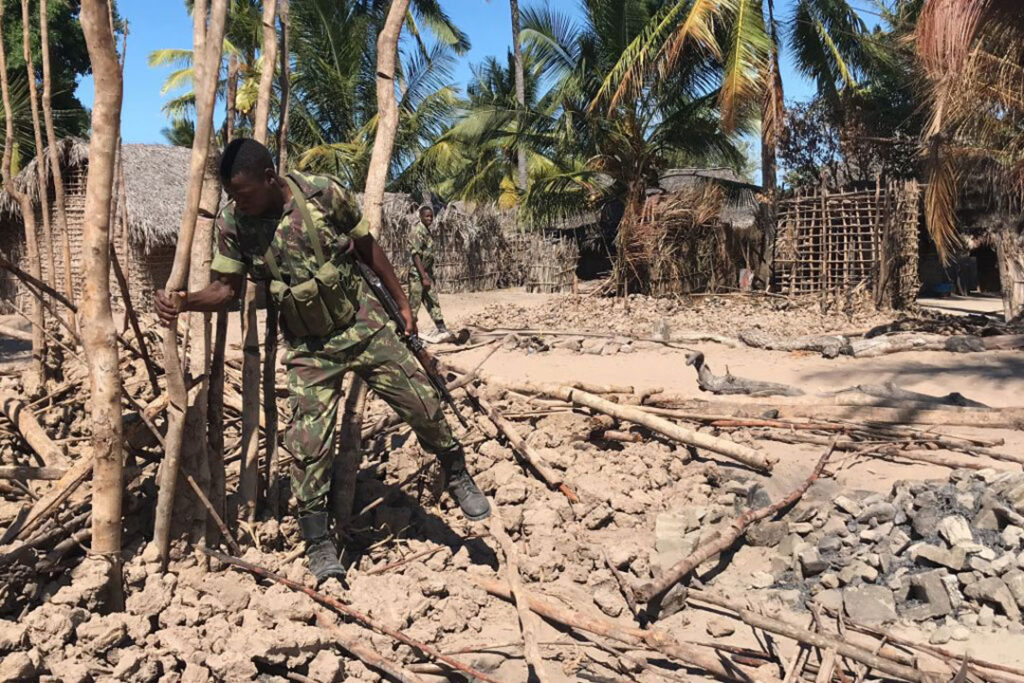ADF STAFF
In the villages known as aldeias in Mozambique’s far north province of Cabo Delgado, attacks come before dawn. Militants open fire at random and set homes ablaze. Those lucky enough to escape flee into dense forest or pile into boats to risk their lives at sea. Those who do not escape face a far worse fate.
“They kidnap the women to violate them and force them into marriage,” Fatima, a woman whose village was attacked in July, told reliefweb. “The older men they kill. The young men are forced to join them [the militants].”
Cabo Delgado is home to Mozambique’s most valuable oil and gas deposits, but it also is ground zero for a violent insurgency that threatens any hope of progress in the country.
According to The Armed Conflict Location & Event Data Project’s statistics through October, militants have carried out 445 attacks in 2020, nearly double the number committed in the same time frame last year, which had 231 attacks.
Rebels have killed more than 2,000 civilians and have displaced more than 300,000 people since 2017.
“Civilians and especially women and children bear the brunt of mass human rights violations that include brutal attacks and kidnapping,” United Nations’ Refugee Agency spokesman Babar Baloch said in a press conference.
“There have been horrifying reports of extreme brutality unleashed on civilians by nonstate armed groups in the Muidumbe district. Schools, health centers, private houses and government infrastructures have also reportedly been targeted and destroyed.”
In August, Islamist militants captured the strategic port of Mocimboa da Praia for the third time this year in coordinated attacks from the land and sea. A month later, they seized two islands off the coast, burned down luxury resorts and drove out residents. Two high-profile massacres of civilians have outraged human rights groups around the world.
The Islamic State has claimed responsibility for a number of this year’s attacks, but its level of involvement is unclear. The insurgency had roots in a sectarian conflict launched in 2017 by Muslim extremists in Mocimboa da Praia. The local movement was co-opted in June 2019 as part of the Islamic State’s Central Africa Province.
Piers Pigou, International Crisis Group senior consultant for Southern Africa, said the homegrown terror group’s ties to the Islamic State are still a mystery.
“We’ve seen increasing levels of sophistication in the strategy and tactics they’ve employed and more sophisticated weaponry,” he told Al-Jazeera. “This has raised questions about IS influence. We see the connection in the media jihad attached to the claims of responsibility, but the hard evidence of IS engagement and actors on the ground is still speculative.”
Some of the success of the insurgency is due to a lack of organized resistance. Mozambique’s top security forces are occupied with primarily guarding multibillion-dollar oil and gas facilities, leaving undertrained Soldiers to fight the rebels.
The first significant attack outside Mozambique by the group occurred in mid-October on the border between Cabo Delgado and Tanzania. A police chief in Mtwara, Tanzania, reported that 300 terrorists stormed a nearby village, killed at least 20 civilians and forced dozens to flee.
This led to calls for regional and international support, as Mozambique shares borders with six other nations — Eswatini, Malawi, South Africa, Tanzania, Zambia and Zimbabwe.
“Mozambique should not be expected to deal with a potential regional security threat of this gravity and magnitude alone,” Zimbabwean politician Patrick Chinamasa said in an October 28 press conference. “As a member of (the South African Development Community) and the AU [African Union], Mozambique should have recourse to regional and collective support.”

